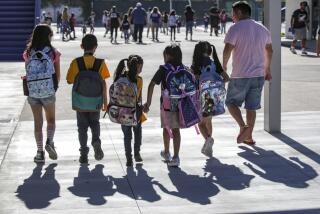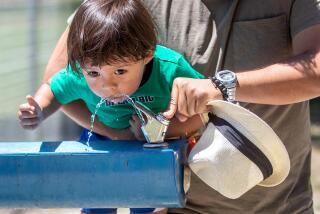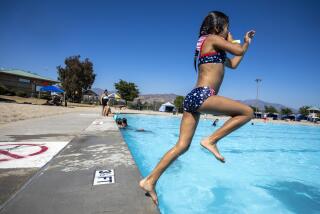Keeping Kiddies Safe in Summer
- Share via
Tomorrow officially kicks off the summer season, a time when your children’s safety is especially at risk. Here, the experts weigh in with tips on keeping the little ones out of harm’s way.
Water:
* Make sure your child wears a life vest when boating or fishing even if the child knows how to swim.
* Keep an eye on toddlers; a child can drown in an inch of water.
* An adult who can swim should always be present.
* If you have a swimming pool, make sure it is fenced and has a lock on the gate when not in use.
* Whenever possible, keep a portable phone near the pool.
* Children should be careful around creeks and lakes during times of high water, which is when snakes are more prevalent.
Biking / skating:
* Make sure your child wears a helmet.
* Equip your child with knee and elbow pads (skating).
Sun protection:
* Provide plenty of water to prevent dehydration; avoid carbonated drinks.
* Apply a sun block with an SPF of at least 15 about 30 minutes before going outside.
* Make sure baby wears a hat and is under a beach umbrella.
* Sunburn can occur when it’s cloudy and cool; dress baby in a lightweight, long-sleeved shirt and long pants.
Playgrounds:
* Avoid any equipment or installations (such as benches) made with angles or openings that could trap a child’s head or any other part of the body.
* Make sure play areas are separated by age group, type of equipment and active or passive play.
* Pathways that link activity areas should allow for easy travel between areas and unobstructed vision for a child’s height.
* Make sure handrails are easy to grasp.
* Playground surfaces should be soft, using materials such as wood mulch or chips, shredded tires or sand.
* Don’t allow children to use playground equipment in ways that were not intended, such as riding a bike down a slide.
Picnics:
* Wash fruit and vegetables at home.
* Keep uncooked chicken wrapped in aluminum foil or heavy paper until you are ready to cook or marinate and prevent other foods or cooking surfaces from coming in contact with raw poultry.
* Keep foods containing eggs, meat or dairy products under constant refrigeration until they are consumed.
* Avoid putting snack foods such as nuts and chips in community bowls; instead prepare individual snack packages.
Backyard:
* If cats frequent your backyard, cover the sandbox when children are not playing in it.
* Clear the area of pebbles, pieces of wood, poisonous plants or other objects that small children can put in their mouths.
* Don’t allow water to collect and stagnate.
* Never leave gardening tools where children can fall on or find them.
* Sources: Heather Paul, executive director of the National SAFE KIDS Campaign; Disney Babies; Dr. Shirley Fannin, director of communicable disease control, Los Angeles County Department of Health Services; Prudential HealthCare; American Academy of Orthopaedic Surgeons; U.S. Consumer Safety Commission; Children’s World Learning Centers.
More to Read
Sign up for The Wild
We’ll help you find the best places to hike, bike and run, as well as the perfect silent spots for meditation and yoga.
You may occasionally receive promotional content from the Los Angeles Times.






